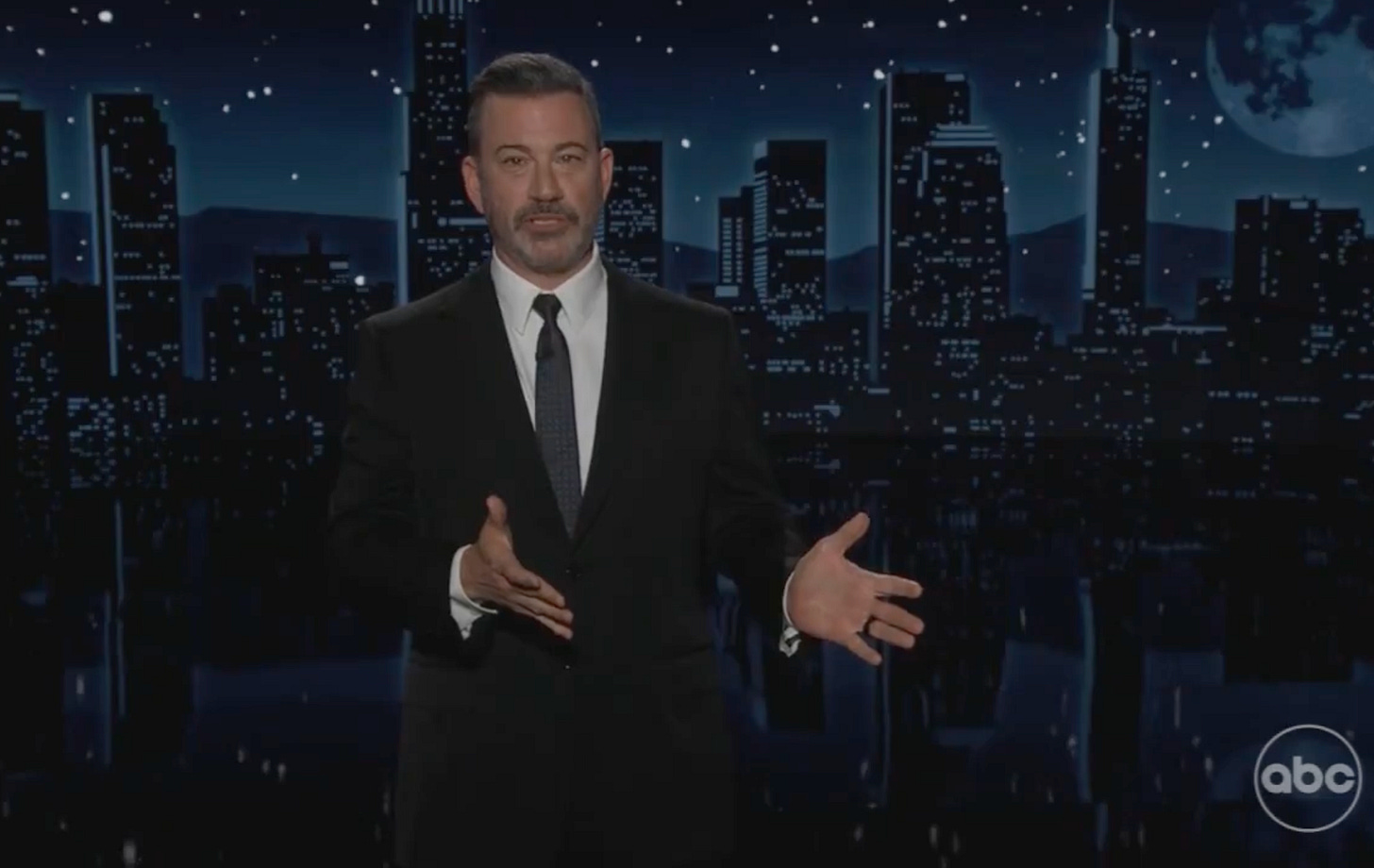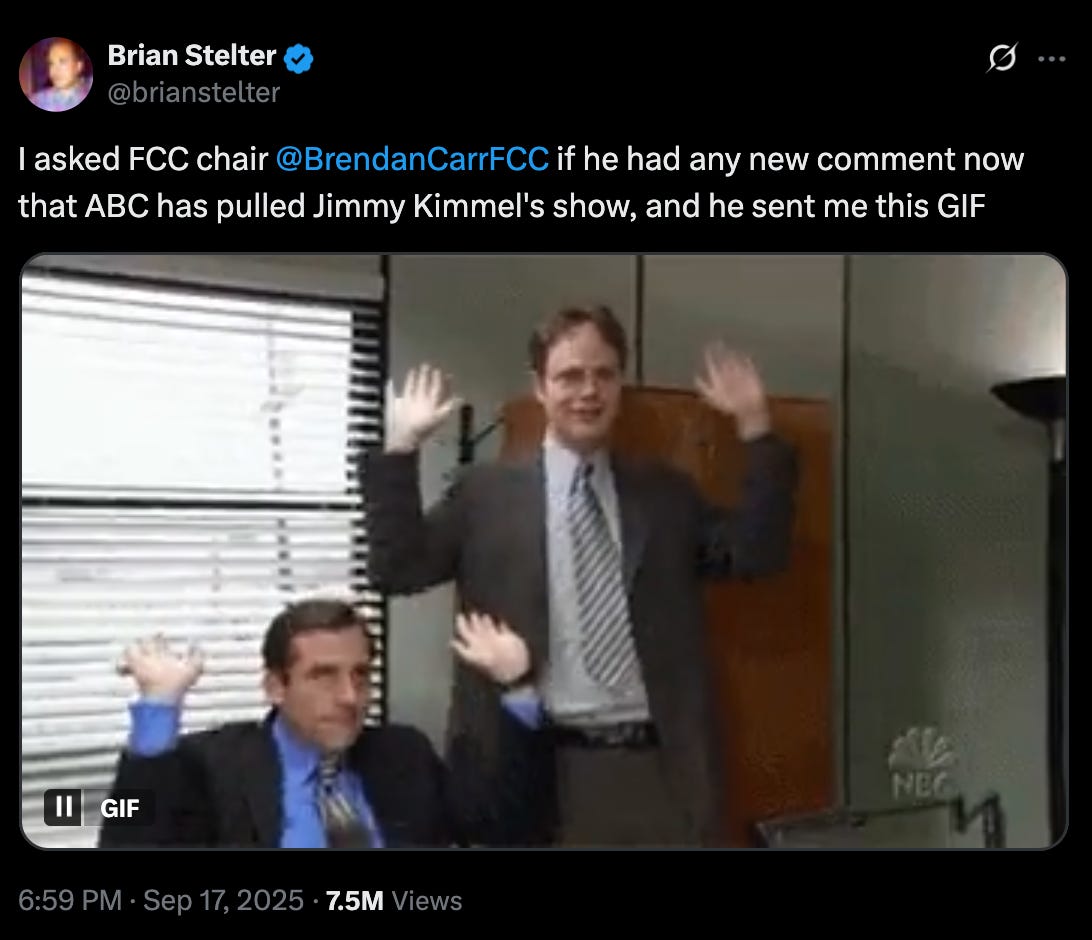Kimmel censorship: Free speech group denounces scheme to 'extort' ABC
The FCC chair threatened the network: "We can do this the easy way or the hard way."
The capitulation of major networks under government pressure reinforces the need to support trusted and responsible independent media.
When ABC announced the indefinite suspension of Jimmy Kimmel’s late night show, most public commentary focused on the network’s sensitivities in the wake of Charlie Kirk’s fatal shooting.
Now, the brazen hand of government censorship has come into clearer view.
Shortly before Kimmel’s benching, Donald Trump’s Federal Communication Commission chairman Brendan Carr delivered a Mafioso-type warning to the network on a right-wing podcast: “We can do this the easy way or the hard way.”
Kimmel’s monologue criticized certain segments of the “MAGA gang” for their eagerness to ascribe political beliefs to Kirk’s suspected killer Tyler Robinson before they became known, but the debate over Kimmel’s comments elided the government machinations playing out in the backdrop.
Possible action item: Calling your reps
The most popular topic for calling U.S. lawmakers on the app 5 Calls is “Stop the Assault on Our Freedom of Speech,” demanding oversight hearings on Carr’s actions.
“Nice network you got”
In an interview, First Amendment lawyer Adam Steinbaugh from the Foundation for Individual Rights and Expression (FIRE) explained why that type of pressure campaign on the major broadcasters is par for the course for Carr, who openly threatened to block Paramount’s multibillion-dollar merger before its subsidiary CBS settled with Trump earlier this year, sparking bribery accusations.
“They say, ‘Hey, nice network you got here. Wouldn't it be a shame if something were to happen to it?’” Steinbaugh said in an interview with All Rise News on the MeidasTouch Network’s Legal AF.
Note: You can watch the full interview below.
Carr gave his not-too-dissimilar warning on the podcast of Benny Johnson, a disgraced journalist and serial plagiarist turned MAGA influencer with a close relationship to Trump, and Johnson gleefully took credit for Kimmel’s suspension.
“We had FCC Chairman Brendan Carr on the show to announce investigations into ABC and Disney for letting Kimmel lie to millions about Charlie Kirk’s assassination,” Johnson posted. “Hours later, Kimmel was gone. It ain’t much, but it’s honest work.”
Asked for comment on Kimmel’s suspension for CNN, Carr sent the network’s media analyst Brian Stelter a celebratory meme.
In a statement, FIRE said that the network “caved.”
“Another media outlet withered under government pressure, ensuring that the administration will continue to extort and exact retribution on broadcasters and publishers who criticize it,” the group wrote. “We cannot be a country where late night talk show hosts serve at the pleasure of the president. But until institutions grow a backbone and learn to resist government pressure, that is the country we are.”
Before the broader network announced the suspension, Nexstar dropped Kimmel’s show on ABC-affiliated stations on its network. Nexstar is currently pursuing a $6.2 billion merger to acquire TEGNA Inc., which will require FCC approval.
“Cancel culture part of the tragedy cycle”
Across the TV landscape, the Center for American Rights, a right-wing advocacy group, brought more pressure to bear with FCC complaints against three major broadcasters: ABC, NBC, and CBS. To date, two of those complaints appear to have achieved their purpose.
For Steinbaugh, it’s a storm of government pressure.
“First you have the president of the United States in July saying, ‘Jimmy Kimmel is next,’ and then you have an organization filing a complaint about Jimmy Kimmel with the FCC,” Steinbaugh said. “And just hours before he was suspended from his show, you have Brendan Carr, the FCC chairman, saying ‘we can do this the easy way or the hard way.’”
Free speech advocates describe that sort of pressure campaign as “jawboning.”
“Jawboning is sort of a concept of instead of the government saying you are prohibited from hosting the speech — or this speech is prohibited, and if you do this, you're going to go to jail or a particular regulatory action will follow,” Steinbaugh noted.
Since Kirk’s death, FIRE has been vigilant about a nationwide campaign to punish those accused of mocking the killing, describing it as the “cancel culture part of the tragedy cycle.”
“As free speech advocates, it places us in a painful position,” one of the group’s executives wrote. “Charlie Kirk’s assassination was an attack on free speech and open discourse. In a free society, we must not be afraid to express our views, no matter how strongly some might oppose them. That’s the point of free speech. But it is precisely for that reason why we must not respond to mockery of Kirk’s assassination by canceling everyone who offends us: because that too creates a society where people are afraid to express themselves.”
Representing a nonpartisan group opposing threats to speech across the political spectrum, Steinbaugh said that FIRE’s ethos is particularly important now: “I think it sends a more important message when someone can say, ‘You know what? I really find this speech offensive. I really dislike this, but the alternative of allowing the government to pick winners and losers is much worse.”




